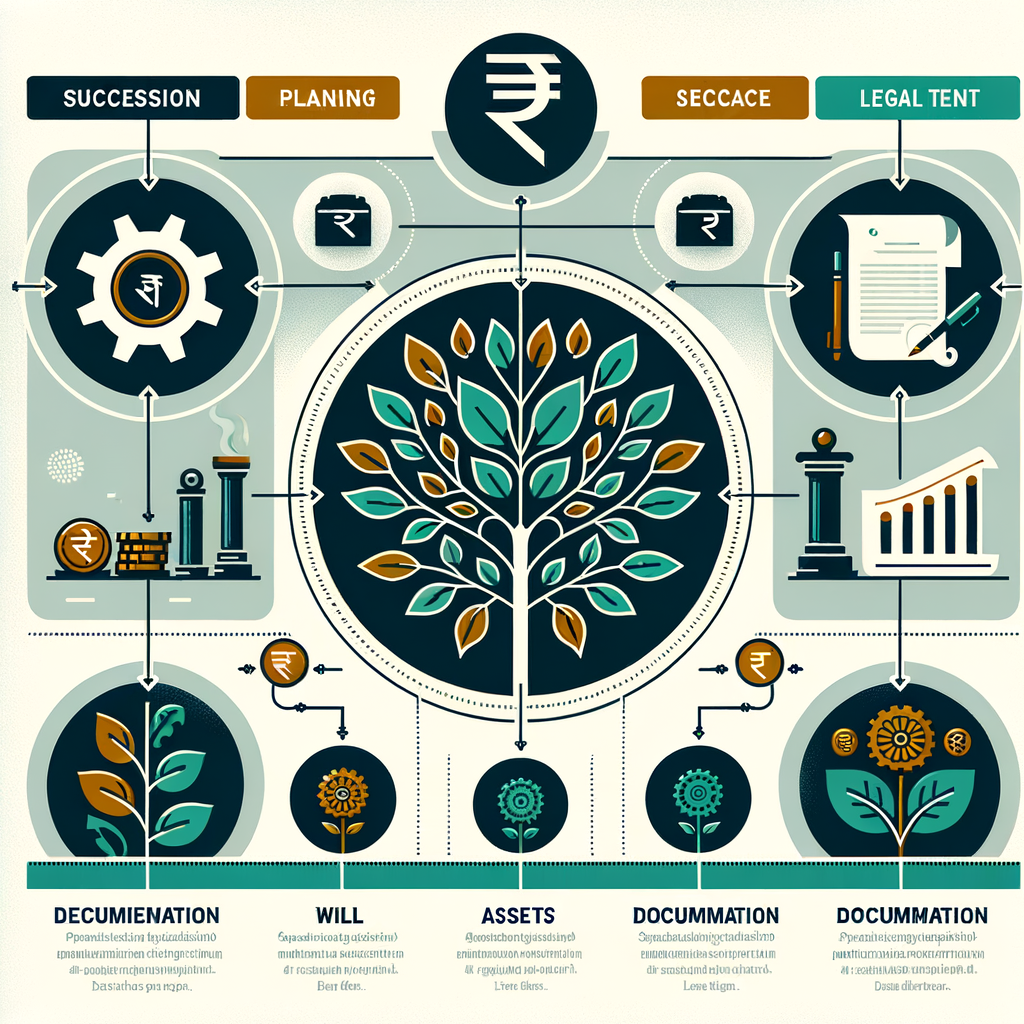Succession Planning and Estate Management: Best Practices for Indian Families and Businesses
What happens to your hard-earned business or assets after you’re gone? It’s a question many Indian families and business owners avoid, but ignoring it can lead to devastating family conflicts, wealth erosion, and the collapse of a lifelong legacy. Proactive planning is the only shield against such a future. This is where succession planning and estate management come in—they are not just legal formalities but powerful tools to secure your family’s future and ensure a smooth transition of your assets and responsibilities. In the unique Indian context of joint families, diverse asset classes, and complex inheritance laws, having a clear roadmap is non-negotiable. Following succession planning best practices is not a luxury reserved for the ultra-wealthy; it is an essential responsibility for every prudent individual and forward-thinking entrepreneur in India. This guide will walk you through the essential steps and strategies to protect what you’ve built.
Understanding the Dual Pillars: Succession Planning vs. Estate Management
To build a robust plan, it’s crucial to first understand the two core components that work in tandem. While often used interchangeably, succession planning and estate management serve distinct but interconnected purposes. One focuses on the continuity of a business, while the other deals with the distribution of personal wealth. Grasping this distinction is the first step towards creating a comprehensive strategy that covers all aspects of your legacy, ensuring both your business and your family are protected from future uncertainties and disputes.
For Business Owners: What is Succession Planning?
For entrepreneurs and business owners, succession planning is the strategic process of identifying, nurturing, and preparing future leaders to take over the helm when the current leadership steps down, retires, or is no longer able to lead. It is the bedrock of business continuity. The goal is to ensure that the enterprise continues to thrive and grow seamlessly, without disruption to operations, employee morale, or stakeholder confidence. Effective succession planning strategies for Indian businesses go far beyond simply naming a child or a key manager as the next in line. It involves a detailed, multi-year plan that includes mentorship programs, defining future roles and responsibilities with absolute clarity, and establishing a robust legal and financial framework to facilitate the handover. Choosing the Right Legal Structure for Your Business is a foundational step in this process. It’s about preserving the value and vision of the business for generations to come.
For Individuals & Families: What is Estate Management?
Estate management, on the other hand, is a more personal process focused on the administration, preservation, and transfer of an individual’s personal assets. Your “estate” comprises everything you own—your house, land, bank deposits, investments in stocks and mutual funds, insurance policies, jewellery, and even digital assets. The primary objective of estate management is to ensure these assets are passed on to your chosen beneficiaries (heirs) in the most efficient way possible, minimising potential legal hurdles, family disputes, and tax burdens. Following the best estate management practices for Indian families involves creating legally sound documents like a Will, diligently appointing nominees for your various accounts, and in some cases, setting up a trust to manage assets for specific purposes. These estate management tips for families India are vital for a peaceful and orderly transfer of your wealth according to your exact wishes. Understanding What is estate planning and how is it incorporated in wealth management? provides a broader perspective on securing your financial legacy.
The Cornerstone: Key Succession Planning Best Practices in India
Implementing a robust plan requires a deep understanding of the practical steps involved. The right approach can mean the difference between a smooth transition and a chaotic, value-destroying ordeal for your family and business partners. The following succession planning best practices offer a clear roadmap for both business owners aiming for continuity and individuals focused on securing their family’s financial future. These guidelines are tailored to the Indian legal and social landscape, providing actionable advice to safeguard your legacy effectively.
For Small Business Owners: A Blueprint for a Smooth Handover
- Identify & Train Successors Early: The most critical step is to identify potential successors well in advance. This choice should be driven by competence, skill, and commitment, not just emotion or tradition. Consider both family members and trusted key employees. Once identified, a structured training and mentoring program is essential. The successor needs to understand every facet of the business—from operations and finance to client relationships and company culture. A gradual transition of responsibilities allows them to gain experience and credibility, ensuring they are fully prepared to lead when the time comes.
- Create a Formal Transition Plan: A handshake agreement is not enough. You need a formal, written transition plan. This document should act as a comprehensive guide, detailing a clear timeline for the handover, a precise definition of roles and responsibilities for both the outgoing and incoming leader post-transition, and clear communication protocols for informing employees, customers, and other stakeholders. This eliminates ambiguity and sets clear expectations for everyone involved, preventing power vacuums and internal strife.
- Establish a Buy-Sell Agreement: For businesses with multiple partners or co-owners, a Buy-Sell Agreement is an indispensable legal contract. This agreement pre-determines what happens to a co-owner’s share in the business upon a “triggering event,” such as death, disability, retirement, or even divorce. It specifies who can buy the departing owner’s share, at what price (or the formula to determine the price), and under what terms. This prevents disputes among remaining owners or the deceased owner’s family, ensuring a fair and orderly transfer of ownership.
- Get a Professional Business Valuation: Emotion and personal attachment can cloud judgment when it comes to a business’s worth. Obtaining a periodic, objective business valuation from a qualified professional is critical. This provides a fair, defensible market value for the company, which is essential for the Buy-Sell Agreement, for calculating potential tax liabilities, and for ensuring that the distribution of assets among heirs (some of whom may be active in the business while others are not) is equitable. An independent valuation minimizes the risk of future disputes over the company’s worth. This process is also closely linked to developing the Top Tax Planning Strategies for Startups and SMEs to manage financial outcomes effectively.
For Salaried Individuals & Families: Securing Your Legacy
- Draft a Clear and Legally Sound Will: A Will, or ‘Testament’, is the most fundamental tool of estate planning. It is a legal declaration of your intention regarding the distribution of your assets after your death. In India, a valid Will must be in writing, signed by you (the testator), and attested by at least two independent witnesses who have seen you sign it. A clear, unambiguous Will ensures your assets are distributed exactly as you wish, overriding the default succession laws. After death, your executor may need to get the Will validated by a court through a process called probate, which confirms its authenticity.
- Appoint Nominees Diligently: For assets like bank accounts, fixed deposits, insurance policies, provident funds, and shares, you must appoint a nominee. This ensures that the financial institution can release the funds to the nominee quickly upon your death, avoiding lengthy legal procedures. However, it’s critically important to understand the Supreme Court of India’s stance: a nominee is merely a custodian or a trustee. The nominee holds the assets in trust for the actual legal heirs, who are determined by succession law or, more importantly, by your Will. To avoid confusion, ensure your Will explicitly states that the nominee will also be the final beneficiary of that asset if that is your intention.
- Consider Creating a Trust: A Trust is a powerful estate planning tool that can be particularly useful in specific situations. It involves transferring your assets to a trustee who manages them for the benefit of your chosen beneficiaries. A Trust is highly recommended if you have minor children, dependents with special needs who require lifelong care, or if you want to prevent your heirs from squandering a large inheritance. You can set specific conditions for how and when the assets are to be distributed. In India, you can create a Private Trust for your family members or a Public Trust for charitable purposes.
Essential Legal Tools & Indian Succession Planning Guidelines
Navigating the landscape of estate and succession planning in India requires familiarity with specific legal instruments and the laws that govern them. Following the Indian succession planning guidelines means using the right tools to enforce your wishes and understanding the legal framework within which they operate. These tools are not just paperwork; they are the legal backbone of your entire plan, providing the authority and clarity needed to protect your assets and ensure a smooth transition for your beneficiaries.
The Will (Testament): Your Final Word
As the cornerstone of estate planning, a Will is your ultimate declaration. It allows you to appoint an Executor, a trusted person responsible for carrying out your instructions, settling your debts, and distributing your assets. A significant advantage of a Will is its flexibility; you can change, modify, or completely revoke it at any time during your lifetime as your circumstances or wishes change.
Actionable Tip: Once your Will is finalized, keep the original in a secure and safe location, such as a bank locker or with a trusted lawyer. Crucially, inform your Executor about the Will’s existence and its location to ensure it can be found and acted upon when needed.
Power of Attorney (PoA): Planning for Incapacity
A Power of Attorney (PoA) is a legal document that allows you to appoint a trusted person (the agent or attorney-in-fact) to manage your financial and legal affairs on your behalf. There are two main types:
- General PoA: Grants broad powers to the agent to handle all your affairs.
- Special PoA: Restricts the agent’s authority to specific tasks, like selling a particular property or operating a specific bank account.
A PoA is invaluable for estate management, especially for handling affairs if you become incapacitated due to illness or are living overseas and cannot manage your Indian assets personally.
The Gift Deed: Transferring Assets During Your Lifetime
A Gift Deed is a legal instrument used to transfer ownership of an asset (typically immovable property) to another person without any payment in return, i.e., as a gift. This can be an effective way to transfer assets to loved ones during your lifetime, reducing the size of your estate and potentially simplifying things after your passing. For a Gift Deed transferring immovable property to be legally valid, it must be in writing, signed by the donor, attested by two witnesses, and compulsorily registered with the sub-registrar’s office after paying the applicable stamp duty.
Understanding Applicable Succession Laws in India
The distribution of assets in the absence of a Will is governed by specific personal succession laws, which vary by religion. This complexity underscores the importance of having a Will. The primary laws are:
- The Hindu Succession Act, 1956: Applies to Hindus, Buddhists, Jains, and Sikhs. The landmark 2005 amendment granted daughters equal rights as sons to ancestral property.
- The Indian Succession Act, 1925: Governs succession for Christians, Parsis, Jews, and any property for which a Will has been made (testamentary succession).
- Principles of Sharia Law: Apply to Muslims, with distinct rules for Shia and Sunni sects regarding the distribution of property.
For detailed official texts of these laws, you can refer to the official legislative portal of the Indian government: MyGov Acts & Rules Portal.
Conclusion: Taking the First Step Towards a Secure Future
We’ve covered the critical distinction between succession planning for businesses and estate management for individuals, the essential legal tools like Wills and Trusts, and the importance of a formal plan. The journey to a secure future for your family and business begins with acknowledging the need for a plan. Starting early, defining your objectives clearly, and choosing the right legal instruments are paramount. Remember, implementing these succession planning best practices is not about preparing for an end; it’s about providing a new beginning for your loved ones and preserving your legacy. It is one of the most significant financial and emotional gifts you can give them.
Don’t let procrastination put your life’s work at risk. The complexities of Indian law and family dynamics require expert guidance. Take the first, most important step today. Contact TaxRobo’s experts for personalized estate planning services in India and ensure your legacy is protected for generations to come.
Frequently Asked Questions (FAQs)
1. What is the difference between a nominee and a legal heir in India?
A nominee is essentially a trustee or custodian appointed for an asset (like a bank account or insurance policy). Their role is to receive the asset from the financial institution upon the death of the owner, holding it in trust. A legal heir, on the other hand, is the person legally entitled to inherit the asset as per the applicable succession laws or as specified in a Will. The legal heir is the ultimate owner. A Will is the most effective way to ensure the person you nominate is also the final beneficiary.
2. Is it mandatory to register a Will?
No, registration of a Will is not mandatory in India for it to be legally valid. However, registering a Will with the sub-registrar is highly recommended. A registered Will holds greater evidentiary value and is much harder for disgruntled parties to challenge in court. The registration process involves the registrar verifying the identity of the testator and witnesses, which adds a layer of authenticity and reduces the chances of it being contested on grounds of fraud or coercion.
3. At what age should I start planning my estate?
It is a common myth that estate planning is only for the elderly. The best time to start is as soon as you begin acquiring significant assets or have dependents who rely on you. This could be when you buy your first property, get married, have your first child, or start a business. The sooner you start, the more prepared you will be for any eventuality. Life is unpredictable, and a plan provides security at any age.
4. How often should I review my succession or estate plan?
Your estate plan is not a “set it and forget it” document. It should be a living document that evolves with your life. It is good practice to review your plan every 3 to 5 years. More importantly, you should conduct a review immediately after any major life event, such as a marriage, divorce, the birth or adoption of a child, the death of a beneficiary or executor, or a significant change in your financial status (like selling a business or receiving an inheritance).
5. Can I include my digital assets like social media accounts and cryptocurrency in my estate plan?
Yes, you absolutely should include digital assets in your estate plan. In today’s world, digital assets—including social media profiles, email accounts, domain names, online business accounts, and cryptocurrencies—have both sentimental and monetary value. You can include specific instructions in your Will or create a separate digital asset memorandum. This document should list your digital assets and your wishes for their management, transfer, or deletion. For security, list the accounts and usernames but store the passwords and access keys securely and separately, providing instructions to your executor on how to access them.



